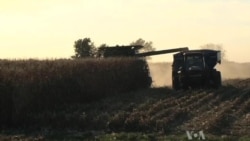POLO, ILLINOIS —
Just one year after a catastrophic drought damaged vast areas of farmland in the Midwestern United States, farmers heading to the fields to harvest one of the best crop yields in years have been dealing with another obstacle - the partial shutdown of the U.S. Government. The shutdown has had a ripple effect, affecting everything from subsidies to loans to the price of grains and meat that farmers are trying to sell.
2013 is shaping up to be a golden harvest for Illinois farmer Brian Duncan. “The crops this year are really good… really good crops.”
The corn stalks in his fields are tall and plentiful, a dramatic change from last year’s harvest, when a historic drought reduced crop yields throughout the United States.
But while much of what Duncan sees is promising, it’s Washington, D.C., that gives him the greatest concern.
“There was supposed to be a major crop report last Friday that could have been a market-moving report one way or the other, the October Crop Reduction Report. It wasn’t released,” he said.
That’s because the U.S. Department of Agriculture was partially shut down, and no one was available to publish the reports.
“When we’ve got the potential for a good size crop coming in, nobody knows how big the crop is, how much the carry over is going to be," said LaSalle County farmer Monty Whipple, who also serves as president of the local Farm Bureau. "All those government programs regarding crop size are on hold because nobody is keeping statistics, because nobody is showing up for work.”
He said the government shutdown has had a ripple effect on farmers across the country.
It’s been noticeable mostly because the branch offices of the Agriculture Department have been closed and government programs for farmers have been on hold.
"If you are expecting any kind of a program payment yet this year, you are obviously not getting it. If you have programs you want to enroll for, they’re not taking enrollments. If you want to put your crop money under loan, that federal loan money that’s available is not going through,” said Whipple.
“I’m waiting for a sign-off on a new hog building, that I’m participating with a government program, the EQIP Program," said Duncan. "And were ready to go. October 1st it should have been signed off on. No one is in the office to sign off on it. So there we sit.”
As Duncan sits in his combine and focuses on this year’s harvest, he also is thinking about next year’s planting season.
“We’re making decisions as far as ordering seed, cropping mix, and we don’t know what insurances will be available to us, what pricing will be available to us, and we sit here without much information,” said Duncan.
That’s because once lawmakers have dealt with the debt ceiling and reopened the federal government, they will have to tackle another issue of big concern to farmers - passing new Farm Bill legislation. The deadline is January 1.
2013 is shaping up to be a golden harvest for Illinois farmer Brian Duncan. “The crops this year are really good… really good crops.”
The corn stalks in his fields are tall and plentiful, a dramatic change from last year’s harvest, when a historic drought reduced crop yields throughout the United States.
But while much of what Duncan sees is promising, it’s Washington, D.C., that gives him the greatest concern.
“There was supposed to be a major crop report last Friday that could have been a market-moving report one way or the other, the October Crop Reduction Report. It wasn’t released,” he said.
That’s because the U.S. Department of Agriculture was partially shut down, and no one was available to publish the reports.
“When we’ve got the potential for a good size crop coming in, nobody knows how big the crop is, how much the carry over is going to be," said LaSalle County farmer Monty Whipple, who also serves as president of the local Farm Bureau. "All those government programs regarding crop size are on hold because nobody is keeping statistics, because nobody is showing up for work.”
He said the government shutdown has had a ripple effect on farmers across the country.
It’s been noticeable mostly because the branch offices of the Agriculture Department have been closed and government programs for farmers have been on hold.
"If you are expecting any kind of a program payment yet this year, you are obviously not getting it. If you have programs you want to enroll for, they’re not taking enrollments. If you want to put your crop money under loan, that federal loan money that’s available is not going through,” said Whipple.
“I’m waiting for a sign-off on a new hog building, that I’m participating with a government program, the EQIP Program," said Duncan. "And were ready to go. October 1st it should have been signed off on. No one is in the office to sign off on it. So there we sit.”
As Duncan sits in his combine and focuses on this year’s harvest, he also is thinking about next year’s planting season.
“We’re making decisions as far as ordering seed, cropping mix, and we don’t know what insurances will be available to us, what pricing will be available to us, and we sit here without much information,” said Duncan.
That’s because once lawmakers have dealt with the debt ceiling and reopened the federal government, they will have to tackle another issue of big concern to farmers - passing new Farm Bill legislation. The deadline is January 1.






